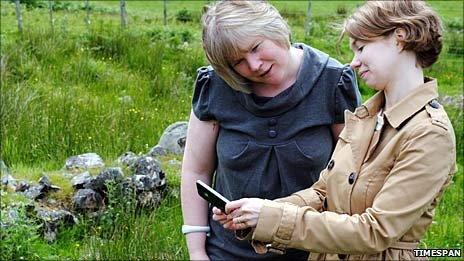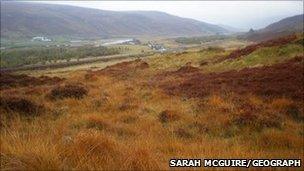Phone app to mark Highland Clearances in Kildonan
- Published

Project manager Jacquie Aitken and museum director Nicola Henderson with a smartphone
A software application is to be developed to help mark the 200th anniversary of the Highland Clearances in a part of Sutherland.
The app for smartphones and tablets will form part of efforts to recall the Clearances in Strath of Kildonan.
Timespan Museum in Helmsdale will officially launch the project on Tuesday night.
The anniversary falls in 2013, however, events will be held over the months leading up to it.
Forcibly evicted
Called Museum Without Walls, the project team will use social networking sites Facebook and Twitter and a new website to publicise the commemorations.

Many families cleared from the Strath of Kildonan emigrated to Canada
Starting in the late 18th Century and running into the 19th Century, the Clearances saw townships occupied by generations of families cleared to make way for large-scale sheep farming and the rearing of deer.
Landowners were seeking to "improve" their estates in line with the industrial revolution. Their hope was to make more capital from the land by running shooting estates, or starting industrial-scale livestock farming.
In some cases people who had lived on the land for generations left voluntarily, while others were forcibly evicted and their homes burned and demolished.
A bronze statue called The Exiles recalling the Clearances stands at the mouth of Strath of Kildonan.
Depicting a family leaving their home, it was created by Black Isle sculptor Gerald Laing.
Many families cleared from the strath emigrated to Canada.
Gold hunt
Better times have been had in the area in more recent times.
Earlier this year, enough gold was recovered from a local burn to help if required in the making of a medal for the London Olympics in 2012.
The stream near the River Helmsdale was panned by volunteers.
Timespan museum in Helmsdale has been leading the effort and has offered the gold to the games' organisers.
About 12 grammes of gold is believed to have been found, enough to plate at least one medal and go towards the making of a second.
The Kildonan gold hunt was launched in 2008, the same year Scots cyclist Chris Hoy won three gold medals at the Beijing Olympics.
- Published3 March 2011